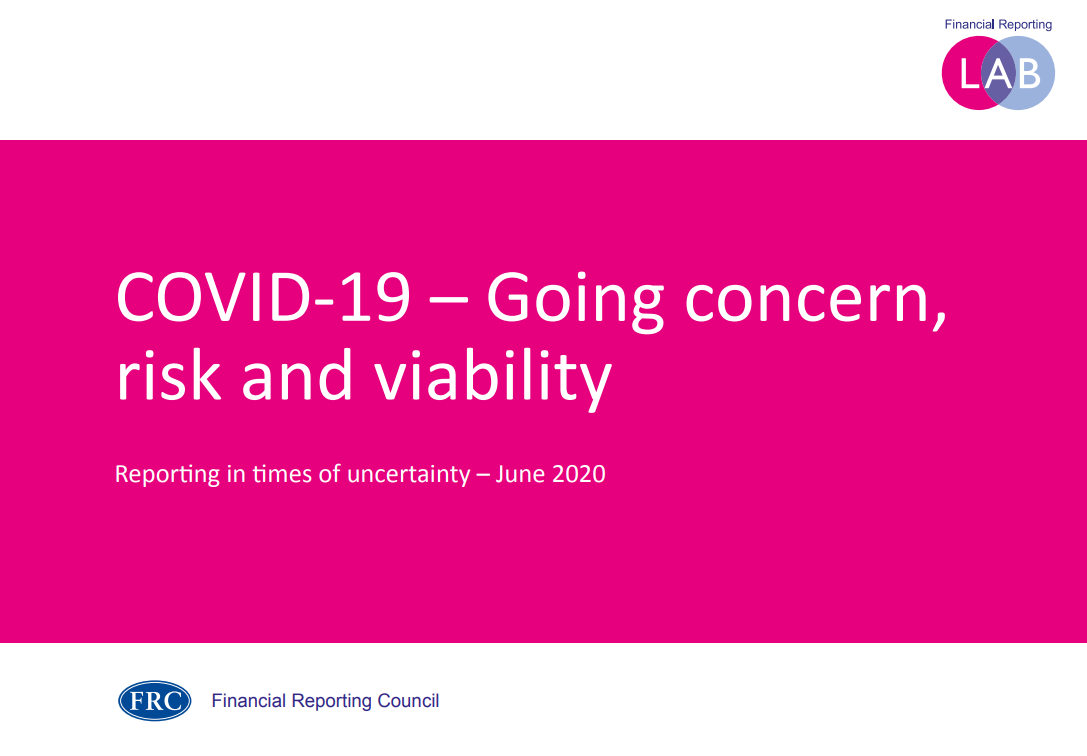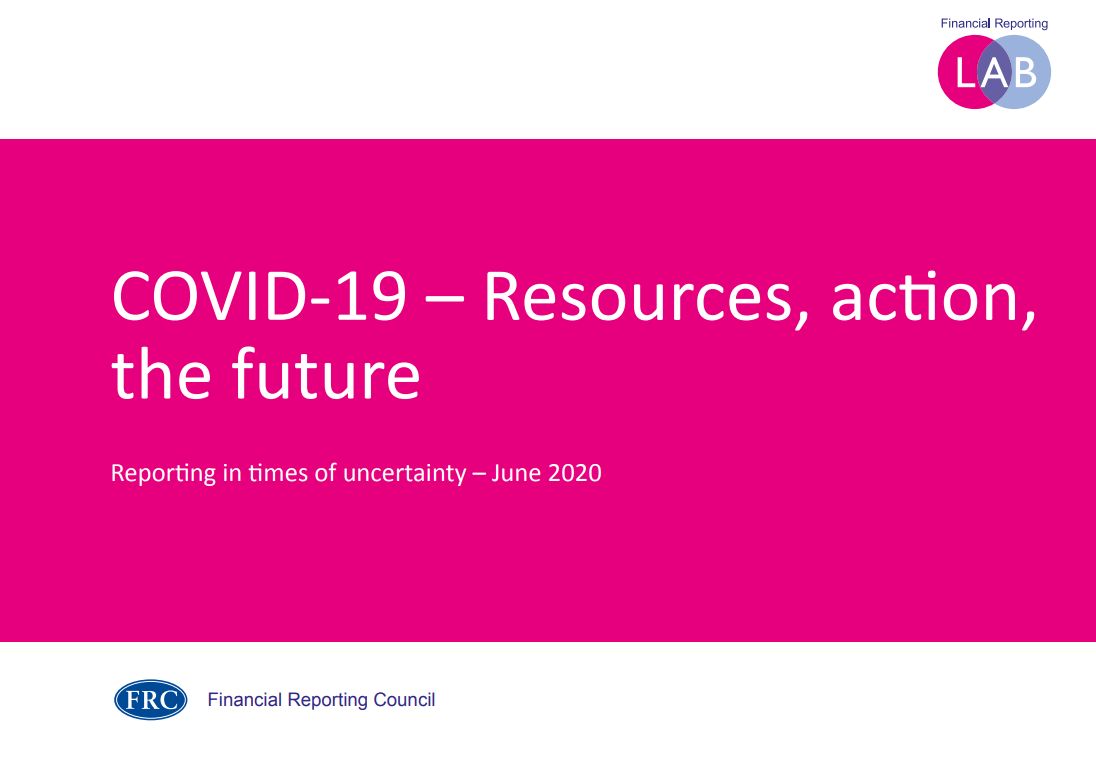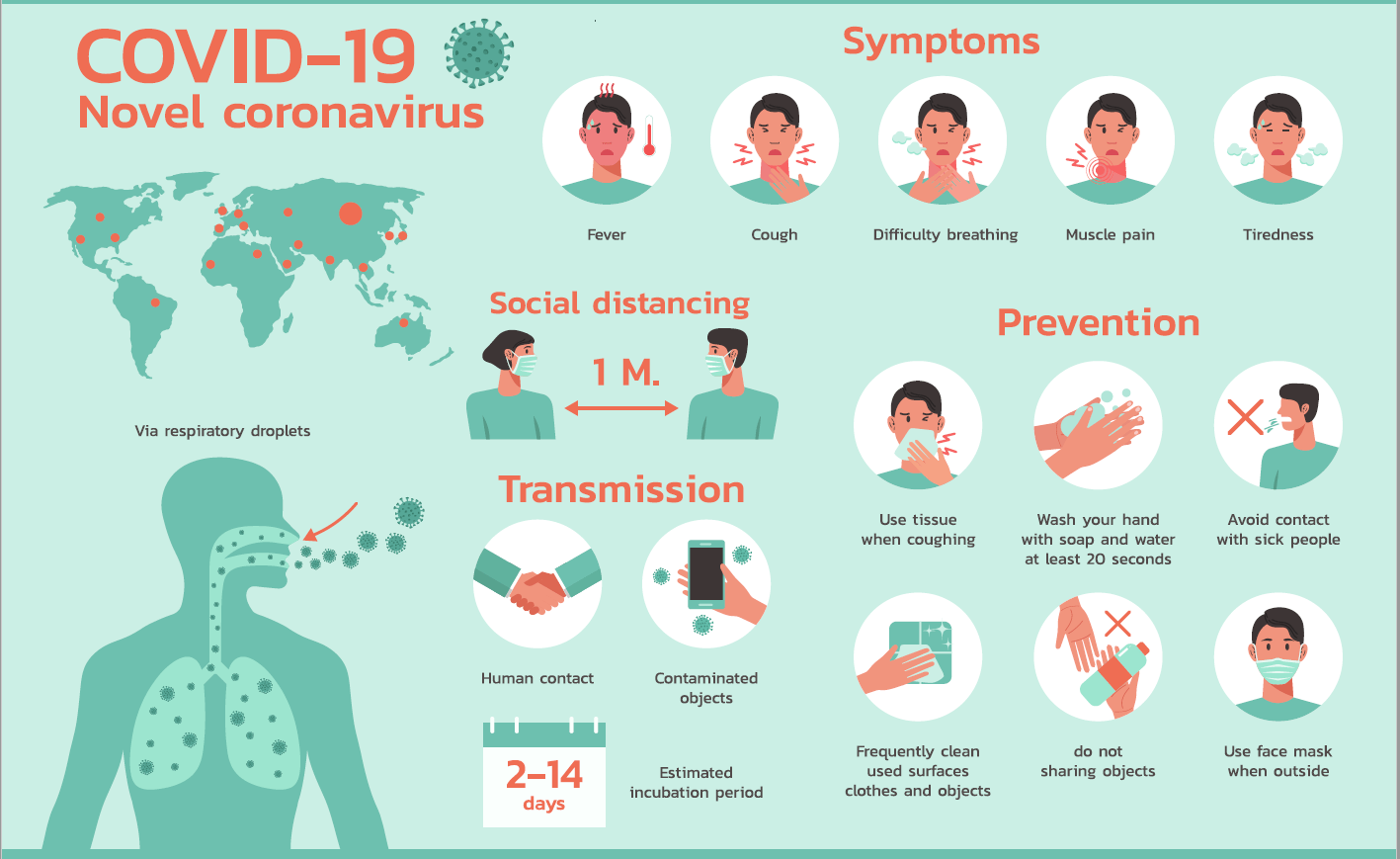
by John McCarthy Consulting Ltd. | Jun 23, 2020 | News
‘Going concern’ is not a simple binary or pass/fail concept. A company can be a going concern even when one or more material uncertainties exist. In such circumstances what becomes important is the disclosure about the uncertainties and management’s consideration of these.’ Quote from the recent Financial Reporting Lab’s guidance on ‘Going concern, risk and viability’ in the midst of the Coronavirus (COVID-19).
The Financial Reporting Lab of the Financial Reporting Council last week published two documents that give clear incisive guidance, with real life examples, dealing with:
The three key areas that need attention and disclosure relating to going concern are:
- Is the company a going concern?
- Has the assessment considered factors relevant to COVID-19?
- Is the disclosure sufficiently detailed?
Covid-19 disclosures
If you are wondering what Coronavirus (COVID-19) disclosures companies should be making in their financial statements, we have the answer. Our recently published survey of 22 public company financial statements focuses on their Coronavirus (COVID-19) disclosures.
Among the disclosures addressed in our report are topics such as:
- Emphasis of Matter
- Key Audit Matters in Audit Reports
- Going Concern/Viability
- Post Balance Sheet Events/Subsequent Events
This thirty-page report, is available on our website, and includes more detail of the types of disclosures that are prevalent at the moment and elaborates on the topics below. All this research is available to purchase for just €125+VAT, for immediate download.
For more on the Coronavirus (COVID-19) disclosures, please see our published report on our website here.
In our Publications Store, you will also find many complementary letters of representation templates that deal with the Coronavirus (COVID-19).

by John McCarthy Consulting Ltd. | Jun 15, 2020 | Blog
In May 2020, the EU Commission predicted that Irish GDP will contract by 7.9% in 2020, as a result of the Coronavirus (COVID-19). The good news is that it has predicted a bounce back of 6.1% in 2021.
In this climate, the provision of accurate financial information will be critical in getting Ireland back to health. Where can we find good, up to the minute guidance on this topic?
The hidden jewel in the crown of the Financial Reporting Council, the Financial Reporting Lab, has, once again, justified this title. On 15 June 2020, the Lab published two documents that give clear incisive guidance, with real life examples, dealing with:
- ‘Resources, actions and the future’ – practical advice to companies setting out the disclosures investors expect to see from companies during this time of uncertainty
- ‘Going concern, risk and viability’ – which gives guidance on going concern, risk and viability disclosures.
This week we focus on the Resources, actions and the future document that helps Directors and others with how to address three key topics in their annual reports:
- Resources – including the availability of cash.
- Actions – to manage short-term expenditure and ensure viability.
- The future – how the decisions taken now ensure the sustainability of the company and impact customers, suppliers and employees.
Covid-19 disclosures
If you would like to more examples of recent Coronavirus (COVID-19) disclosures in financial statements, see our recently published survey of 22 public company financial statements which highlight Coronavirus (COVID-19) disclosures.
The types of disclosures addressed in our report include topics such as:
- Emphasis of Matter
- Key Audit Matters in Audit Reports
- Going Concern/Viability
- Post Balance Sheet Events/Subsequent Events
This thirty-page report, is available on our website, and includes extracts from the types of disclosures that are prevalent at the moment. All this research, saving you time, is available to purchase for just €125+VAT, for immediate download.
For more on the Coronavirus (COVID-19) disclosures, please see our published report on our website here.
In our Publications Store, you will also find many complementary letters of representation templates that deal with the Coronavirus (COVID-19).

by John McCarthy Consulting Ltd. | Jun 8, 2020 | News
The Financial Conduct Authority in the UK said in March 2020 that all London listed companies are permitted two extra months to publish their audited financial results, giving them six months in total.
Meanwhile the Irish Companies Registration Office has further extended the filing deadline for all annual returns that are normally due for filing in the coming months. These will be deemed to have been filed on time if all elements of the annual return are completed and filed by 31st October 2020.
The filing arrangements for Industrial & Provident Societies, Friendly Societies and Trade Unions for filing with the Registry of Friendly Societies are extended to 31st December 2020.
Covid-19 disclosures.
Are you wondering what Coronavirus (COVID-19) disclosures companies should be making in the financial statements to achieve a true and fair view?
We have the answer. Our recently published survey of 22 public company financial statements focuses on their Coronavirus (COVID-19) disclosures.
Of the companies that included Coronavirus (COVID-19) somewhere in their annual reports, Coronavirus (COVID-19) was included in the audit reports of all four companies that had January year ends.
Other disclosures addressed in our report include topics such as:
• Emphasis of Matter
• Key Audit Matters in Audit Reports
• Going Concern/Viability
• Post Balance Sheet Events/Subsequent Events
This thirty-page report, is available on our website, and includes more detail of the types of disclosures that are prevalent at the moment and elaborates on the topics below. All this research is available to purchase for just €125+VAT, for immediate download.
For more on the Coronavirus (COVID-19) disclosures, please see our published report on our website here.
In our Publications Store, you will also find many complementary letters of representation
templates that deal with the Coronavirus (COVID-19).

by John McCarthy Consulting Ltd. | Jun 2, 2020 | Blog
We have recently published a survey of 22 public company financial statements focusing on their Coronavirus (COVID-19) disclosures.
Of those companies surveyed, the John Lewis Partnership plc had some of the greatest level of going concern discussion in the notes to the financial statements, with a prominent note under the ‘Basis of Preparation’ section on page 95.
Our thirty-page report, is available on our website, and includes more detail of the types of disclosures that are prevalent at the moment and elaborates on the topics below. All this research is available to purchase for just €125+VAT, for immediate download.
The various disclosures in the report cover topics such as:
• Emphasis of Matter
• Key Audit Matters in Audit Reports
• Going Concern/Viability
• Post Balance Sheet Events/Subsequent Events
For more on the Coronavirus (COVID-19) disclosures, please see our published report on our website here.
In our Publications Store, you will find many complementary products that deal with the Coronavirus (COVID-19), especially letters of representation that seek written representations from the management of relevant entities about their preparedness for the future impact of the virus on their organisations.

by John McCarthy Consulting Ltd. | May 26, 2020 | Blog
Last week we highlighted in our published survey of 22 public company financial statements an example of an Emphasis of Matter audit report.
This week, our blog focuses on an extract from the Irish company Grafton plc (in its 31 December 2019 financial statements) which describes the risk: ‘The Group is exposed to the impact of the recent outbreak of the (COVID-19) virus epidemic in the countries where it operates and also in countries where some of its suppliers are based’.
This thirty-page report, just published on our website, is available to purchase for €125+VAT, for immediate download.
The various disclosures in the report cover topics such as:
• Emphasis of Matter
• Key Audit Matters in Audit Reports
• Going Concern/Viability
• Post Balance Sheet Events/Subsequent Events
For more on this topic please see our published report on our website here.
In our Publications Store, you will find many complimentary product that deal with the Coronavirus (COVID-19), especially letters of representation that seek written representations from the management of relevant entities about their preparedness for the future impact of the virus on their organisations.

by John McCarthy Consulting Ltd. | May 20, 2020 | Blog
Coronavirus (COVID-19) disclosures in published financial statements
In our published survey of 22 public company financial statements we highlight several useful examples of disclosure that company directors, auditors, accountants and financial controllers will find of relevance, in the midst of the Coronavirus (COVID-19) pandemic.
This thirty-page report, just published on our website, is available to purchase for €125+VAT, for immediate download.
The various disclosures in the report cover topics such as:
• Emphasis of Matter
• Key Audit Matters in Audit Reports
• Going Concern/Viability
• Post Balance Sheet Events/Subsequent Events
The company with the Emphasis of Matter audit report was Martin Currie Global Portfolio Trust plc (a company that invests in alternative investment instruments) with a 31 January 2020 year end. Its financial statements were signed off by the auditors on 9 April 2020. Note 18 to the accounts states that since the period end up to 7 April 2020, the company’s net assets fell by 6.8%.
For more on this topic please see our published report on our website here.here.










